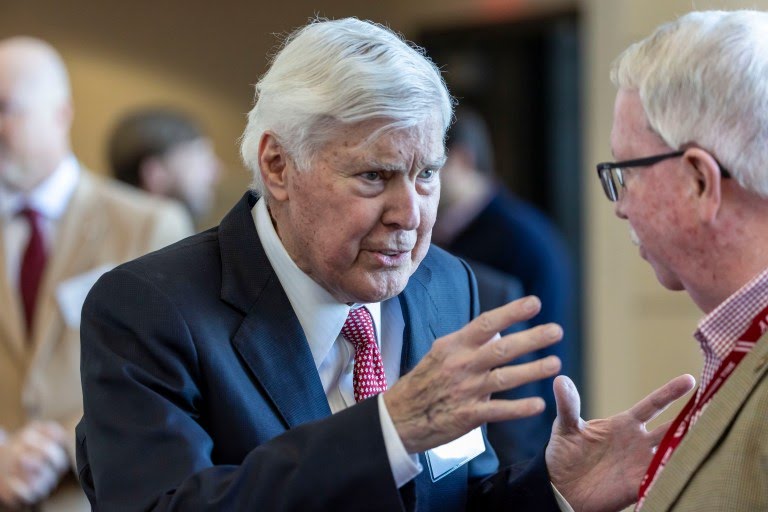Bill Battle, a towering figure in the world of college sports, passed away at the age of 79, leaving behind a remarkable legacy as both a coach and athletic administrator. Known for his tenure as head coach of the University of Tennessee football team, Battle also made his mark in college athletics as the athletic director at the University of Alabama. Moreover, his entrepreneurial spirit led him to found a highly successful sports licensing company, which revolutionized how collegiate merchandise was marketed and sold. Battle’s death marks the end of an era for college football, as his contributions extended far beyond the playing field and into the business of college athletics.
Early Life and Playing Career
Born on July 12, 1945, in Birmingham, Alabama, Bill Battle was a star athlete from a young age. He attended the University of Alabama, where he played for legendary head coach Paul “Bear” Bryant. Battle was a standout offensive lineman for the Crimson Tide, earning All-American honors and playing a crucial role in Alabama’s success during the 1960s. His talent on the field paved the way for a successful career in coaching, but it was his leadership, discipline, and vision that would define his future in the sport.
Head Coach at Tennessee
Battle’s coaching career began in earnest when he was hired as the head coach at the University of Tennessee in 1970. Taking over a program that had been in a period of flux, Battle quickly made his mark with his leadership style, which combined strategic innovation and a no-nonsense approach to discipline. He had a reputation for developing tough, fundamentally sound teams, and under his guidance, the Volunteers reached new heights.
Battle’s time at Tennessee was highlighted by a successful 1971 season, which included an 11-1 record and a Peach Bowl victory. He also led the Vols to several winning seasons and bowl appearances during his tenure. While Tennessee never won a national championship under Battle’s leadership, his impact on the program was immense, with many crediting him for laying the foundation for future success.
However, after six seasons with Tennessee, Battle’s time as head coach came to an end in 1976. Despite the success he had achieved, there were tensions between him and the university’s administration, which led to his departure. Nevertheless, Battle’s influence on the program remained, and many of his former players would go on to become key figures in the world of college football.
Athletic Director at Alabama
Following his departure from Tennessee, Battle’s career took a significant turn when he was appointed as the athletic director at the University of Alabama in 1982. At Alabama, Battle took the helm of one of the most storied athletic programs in the country. Under his leadership, the Alabama athletic department flourished, particularly the football program, which was once again under the direction of his former coach, Paul Bryant. Battle played a pivotal role in overseeing the university’s sports programs and helping shape Alabama’s future in collegiate athletics.
His tenure as Alabama’s athletic director saw the university secure a wealth of championships in multiple sports. He was instrumental in the construction of new facilities, including the expansion of Bryant-Denny Stadium, which allowed Alabama to remain one of the most competitive schools in the nation. Battle also played a key role in the growth of Alabama’s national and international brand, helping to elevate the school’s athletic programs to new levels of prominence.
Founder of Licensing Company
In addition to his roles as a coach and athletic administrator, Battle’s entrepreneurial spirit led him to found The Collegiate Licensing Company (CLC) in 1981, a company that would go on to change the landscape of collegiate sports licensing. CLC provided a framework for universities and colleges to license their names, logos, and trademarks to manufacturers, opening the door for a new revenue stream in the world of college athletics.
Under Battle’s leadership, CLC grew rapidly and became the largest collegiate licensing firm in the country. The company worked with hundreds of colleges and universities, helping them to capitalize on the merchandising boom that was sweeping across the sports world. CLC’s influence spread across the industry, shaping how colleges and universities marketed their athletic programs and merchandise.
In 2001, CLC was sold to IMG, but its lasting impact on the world of college athletics cannot be overstated. The company’s model was emulated by many other universities, and it helped to usher in an era where college athletics became not only a cultural institution but also a significant financial powerhouse.
A Legacy Beyond Sports
Bill Battle’s contributions to college athletics extended far beyond his time on the sidelines or in the administrative offices. He was a visionary who understood the potential for college sports to become a multi-billion-dollar industry. His work in the realm of sports licensing helped shape the modern era of college athletics, where universities and colleges are able to profit from their sports programs in ways that were previously unimaginable.
Battle was also known for his philanthropic efforts, giving back to the communities he worked in and supporting various causes throughout his life. He served on numerous boards and committees, including those that governed NCAA rules and regulations, and was a frequent advocate for the growth and improvement of college athletics. His influence on the game, both on and off the field, is immeasurable.
Remembering Bill Battle
The news of Bill Battle’s passing has left the college athletics community in mourning. Coaches, administrators, former players, and fans alike have paid tribute to his remarkable contributions to the sport. His legacy is cemented not only in the history of the University of Tennessee and the University of Alabama but in the world of college sports as a whole.
“Bill was a true pioneer in collegiate athletics,” said Greg Byrne, Alabama’s current athletic director, in a statement. “His leadership, vision, and influence helped shape the direction of college sports for generations. He was a mentor, a friend, and a role model for so many of us.”
Former players from both Tennessee and Alabama have also shared their memories of Battle, recalling the profound impact he had on their lives, both as a coach and as a mentor. “Coach Battle taught us so much more than football,” said a former player. “He taught us about life, discipline, and how to be leaders.”
A Tribute to a Giant
Bill Battle’s legacy will endure in the annals of college football history, in the programs he helped build, and in the generations of athletes, coaches, and administrators who followed in his footsteps. His contributions to the sport will never be forgotten, and his impact on collegiate athletics is a testament to his extraordinary vision and passion for the game.
As fans, players, and coaches reflect on his passing, they do so with gratitude for a man who shaped the future of college sports. Bill Battle’s name will forever be synonymous with excellence, leadership, and innovation in the world of college athletics. His death marks the end of a significant chapter in college football, but his influence will continue to reverberate for years to come.
Rest in peace, Bill Battle. Your legacy will live on in the hearts of those you touched and in the programs you helped build.



